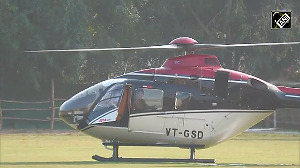 Be it Apple or Research in Motion, Microsoft or Google, all the big names in the world of technology are eager to enter your car's dashboard.
Be it Apple or Research in Motion, Microsoft or Google, all the big names in the world of technology are eager to enter your car's dashboard.
RIM, maker of BlackBerry, has signalled its intention to cash in on this trend by buying QNX Software Systems -- a key software supplier, to some of the world's leading car companies, including Volkswagen, BMW and Hyundai.
Ford, along with software giant Microsoft, has already kicked off its electronics revolution.
So, here's a sneak view of what carmakers are planning to do to your next car.
Ford
All Ford Fiestas built in Thailand, announced the company, would now come with Bluetooth and auxiliary input plug-holes, as well as a voice-control system that allows the driver to command the car to change tracks on the stereo or change the temperature inside the car.
If you want these features, too, ask for Ford Sync -- the company's in-car system that links with phones and MP3 players to offer voice-activated access to music, contact lists and more -- to be integrated in your next buy.
Engineers at Ford, along with students from University of Michigan, have developed iPhone apps, including the one that streams internet radio and another that sends GPS directions from a lead vehicle to several followers.
Audi
Audi has tapped Nvidia's new Tegra 2 graphics processor to power the next-generation digital dashboards in future Audis.
The heavy-duty graphics processor will run Google Earth to show mapping and terrain in full 3D and a data connection can provide news, weather and travel information. Audi expects the first units to appear in 2011.
The carmaker has also launched an interface called MMI Touch in its range-topping A8 sedan. It's a small touchpad on the centre console that allows drivers to simply trace a letter, number or character using their fingers.
Besides, Audi has developed a new in-car sound technology that, Audi's claims, uses a physical principle called "wave field synthesis".
This will create a uniform listening spot in the interiors of the car, unlike a traditional stereo in which the quality of the sound received depends on the listener's position.
The company is testing this technology on its Audi Q7 model and has filled it with 62 speakers five woofers and five tweeters, plus 52 mid-range speakers in the instrument panel, the roof pillars and in the doors.
BMW
Ahead of the Paris Motor Show, BMW has unveiled its new electric scooter prototype -- the Mini Scooter E, which plugs in to a standard household electrical outlet and uses a smartphone for a key.
The scooter has some pretty cool features, including a snap-on adapter for your smartphone that serves as the ignition key.
The smartphone then becomes the scooter's display and control mechanism. The Mini even plans to offer a smartphone app that can tell you when other Mini Scooter Es are in the vicinity.
Moving to four wheel drives, we have seen iPods connecting into car stereos, but BMW's iDevice interface will even let you control apps while driving.
The basic idea is to transform the in-dash entertainment system into a graphically-rich extension of the iPod's user interface, complete with a safer method for interacting with the device.
That said, it uses BMW's jogwheel-like central console controls, so that one does not have to fiddle around with an iPod's clickwheel or iPhone's touchscreen while manoeuvring the wheels.
Mercedes Benz
Mercedes-Benz has decided to add wireless hotspot in its vehicles. The InCar Hotspot uses an antenna to access the Internet and allows up to three devices to use the mobile connection.
It would allow such devices as smartphones and laptop computers to be constantly connected with internet while driving.
The in-car internet access will be available initially in Europe on the E-Class and S-Class sedans, but is likely to find its way across Asia by next year.












 © 2025
© 2025